A cubical vessel has opaque walls. An observer (dark circle in figure below) is located such that she can see only the wall CD but not the bottom. Nearly to what height should water be poured so that she can see an object placed at the bottom at a distance of 10 cm from the corner C ? Refractive index of water is 1.33.
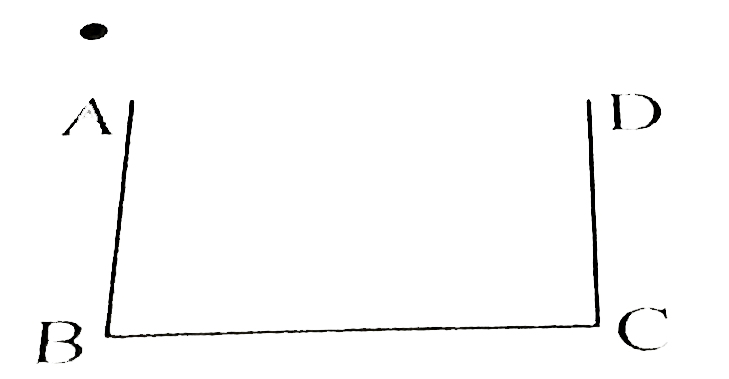
10 cm
16 cm
27 cm
45 cm
The correct Answer is:C
μsini.Sin45∘
43sini=1√2
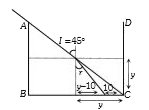
43−y−10√(y−10)2+y2=1√2
⇒y = 27 cm
Topper's Solved these Questions
- RAY OPTICSBOOK - ERRORLESSCHAPTER - RAY OPTICSEXERCISE - NCERT BASED QUESTIONS ( Refraction at Curved surface )
61 Videos
- RAY OPTICSBOOK - ERRORLESSCHAPTER - RAY OPTICSEXERCISE - NCERT BASED QUESTIONS ( Prism Theory & Dispersion of Light )
46 Videos
- RAY OPTICSBOOK - ERRORLESSCHAPTER - RAY OPTICSEXERCISE - NCERT BASED QUESTIONS (Refraction of Light at Plane Surfaces)
48 Videos
- MAGNETISMBOOK - ERRORLESSCHAPTER - MAGNETISMEXERCISE - Assertion and Reason
22 Videos
- WAVE OPTICS AND ELECTROMAGNETIC THEORYBOOK - ERRORLESSCHAPTER - WAVE OPTICS AND ELECTROMAGNETIC THEORYEXERCISE - ASSERTION & REASON
27 Videos
Similar Questions
A cubical vessel with non-transparent walls is so located that the eye of an observer does not see its bottom but sees all of the wall CD.
To what height should water be poured into the vessel for the observer to see an object F arranged at a distance of b=10cm from corner D? The face of the vessel is a=40cm. Refractive index of water is 43.
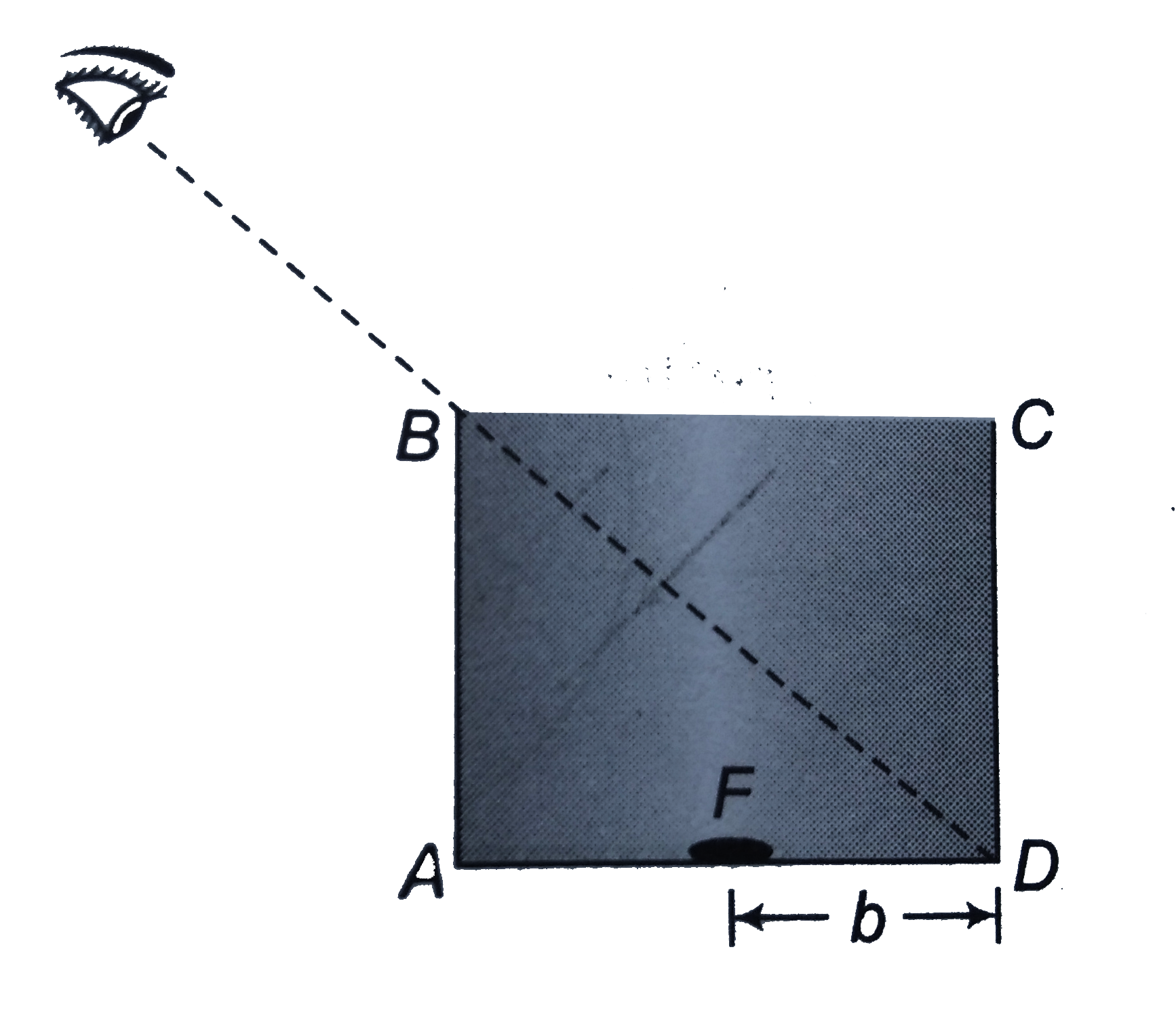
View SolutionA cylinder has a radius 10 cm. To what height should is be filled with water so that the thrust in its walls is equal to that on its bottom ?
View Solution
Knowledge Check
A small bulb is placed at the bottom of a tank containing water to a depth of 80cm. What is the area of the bulb can emerge out? Refractive index of water is 1.33. (Consider the bulb to be a point source.)
A3.13 m2B1.43 m2C2.61m2D0.88m2
Refraction of ray passing through tank filled with water
An observer is viewing along the line shown in Fig. 34-4. When there is no water filled in the tank, he can see only wall AB and no other part of the base of the tank. Then water is filled in till height h and he is just able to see the point E as shown in Fig. 34-3. Find the angle of refraction into air (ϕ) and angle of incidence from water (ϕ). Also find the depth to which water has been filled.
View Solution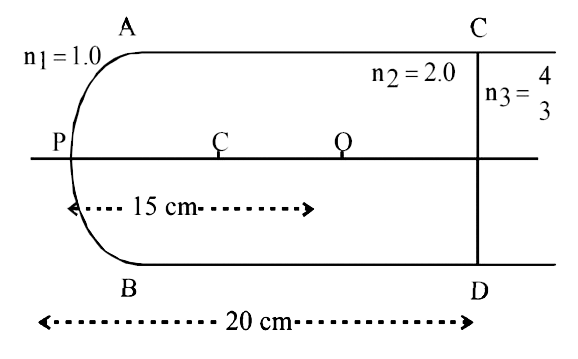
A slab of a material of refractive index 2 shown in fig. has a curved surface APB of radius of curvature 10 cm and a plane surface CD. On the left of APB is air and on the right CD is water with refractive indices as given in the figure. An object O is placed at a distance of 15 cm from the pole P as shown. The distance of the final image of O from P, as viewed from the left is......
View SolutionA cylinder has a radius 20 cm. To what height should it be filled with water so that thrust in its walls is equal to that on its bottom? Find the mass of water filled in cylinder.
View SolutionA thin walled glass sphere of radius 2.5 cm is filled with water. An object (O) is placed at 7.5 cm from the effect of glass wall, at what distance the image (I) of the object , measured from the centre of sphere is formed ? (refractive index of water = 1.333)
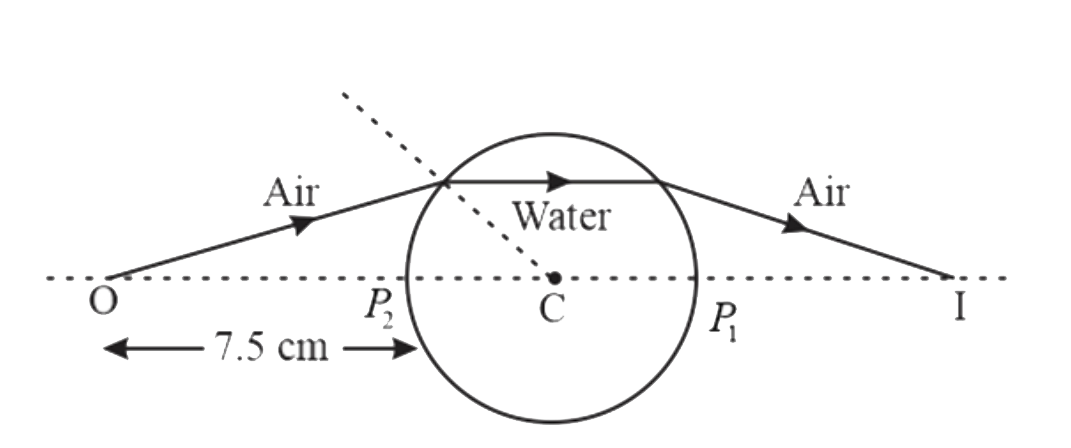
View SolutionA small bulb is placed at the bottom of a tank containing water to a depth of 80 cm. What is the area of the surface of water through which light from the bulb can emerge out? Refractive index of water is 1.33. [Consider the bulb to be a point source]
View SolutionA small bulb is placed at the bottom of a tank containing water to a depth of 80 cm. What is the area of the surface of water through which light from the bulb can emerge out? (Refractive index of water is 1.33. (Consider the bulb to be a point source)
View SolutionThere is one cylindrical vessel whose height and diameter are both equal to D. An observer's eye is placed in such a manner that bottom edge of the vessel is just visible to eye.
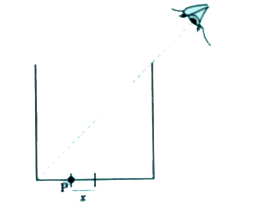
There is a point P at the bottom of container at a distance x from the centre of container as shown in the figure. Up to what height the liquid of refractive index μ should be poured in the vessel so that point P is visible to the eye?
View Solution
